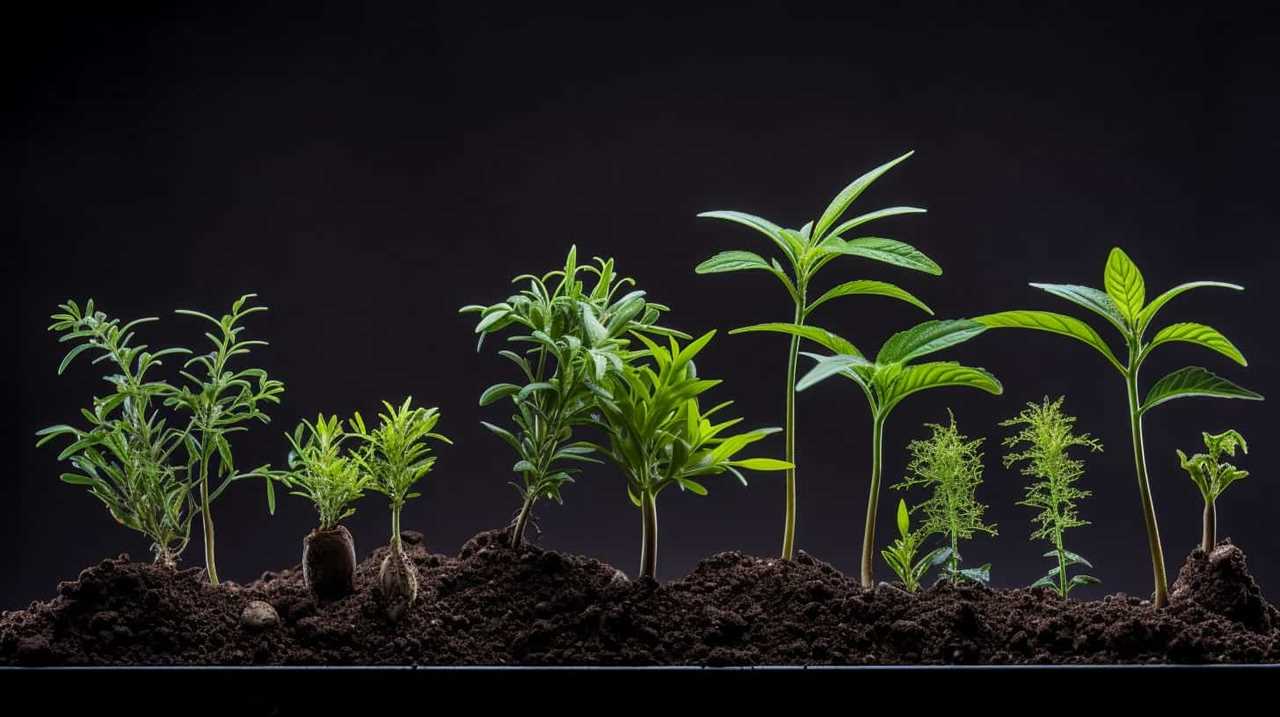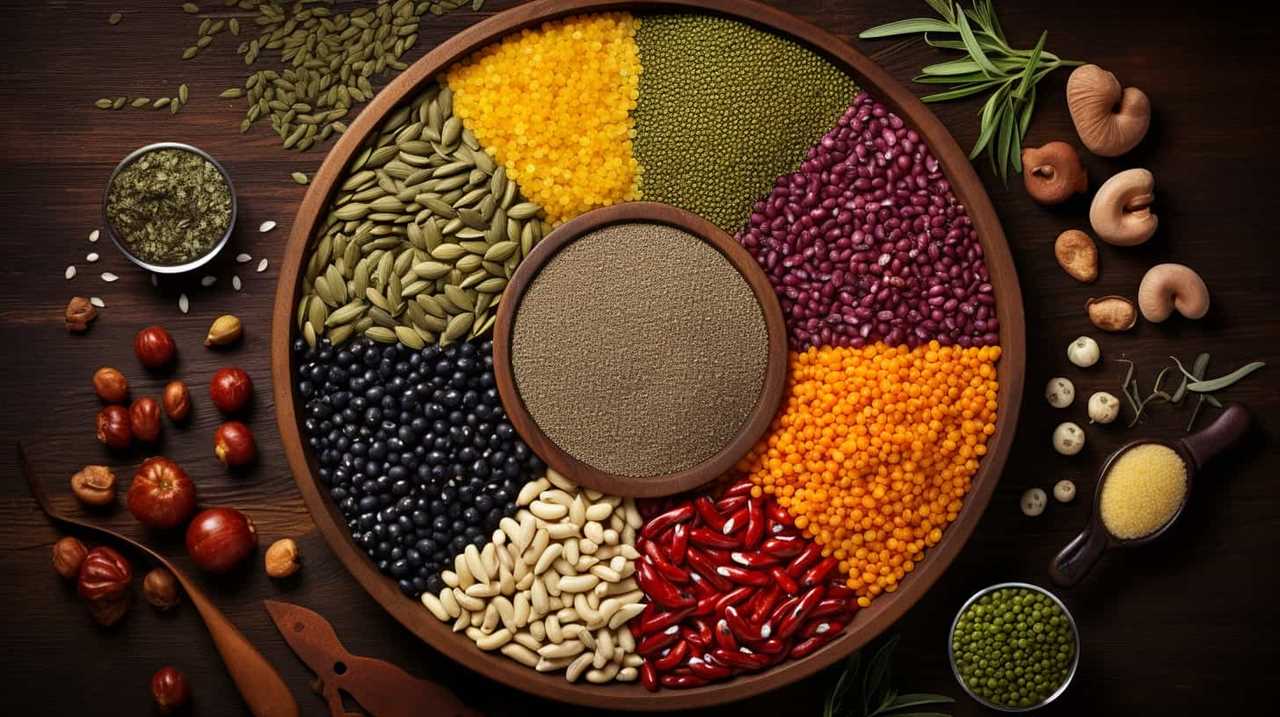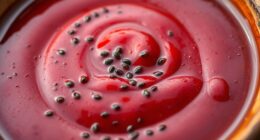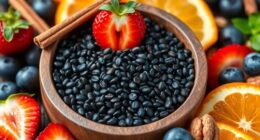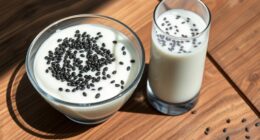Exciting news for those who follow a gluten-free lifestyle! Did you know that incorporating seeds into your meals can greatly boost their nutritional content?
In fact, we’ve compiled 12 tips to help you make the most of your gluten-free diet with the power of seeds. From chia seeds packed with omega-3 fatty acids to boosting fiber intake and enhancing digestive health, this article will provide evidence-based tips to help you nourish your body.
So let’s dive in and discover how seeds can elevate your gluten-free journey!
Key Takeaways
- Chia seeds are packed with essential nutrients like fiber, protein, omega-3 fatty acids, antioxidants, calcium, magnesium, and iron.
- Chia seeds have a higher antioxidant content compared to flaxseeds and pumpkin seeds.
- Chia seeds can be easily incorporated into daily meals to maximize nutrition.
- Including chia seeds in gluten-free baking boosts the fiber content of recipes.
Importance of Chia Seeds in Gluten-Free Diets
One of the key benefits of chia seeds in our gluten-free diets is their high content of essential nutrients. Chia seeds are a powerhouse of nutrition, packed with fiber, protein, omega-3 fatty acids, antioxidants, and minerals like calcium, magnesium, and iron.
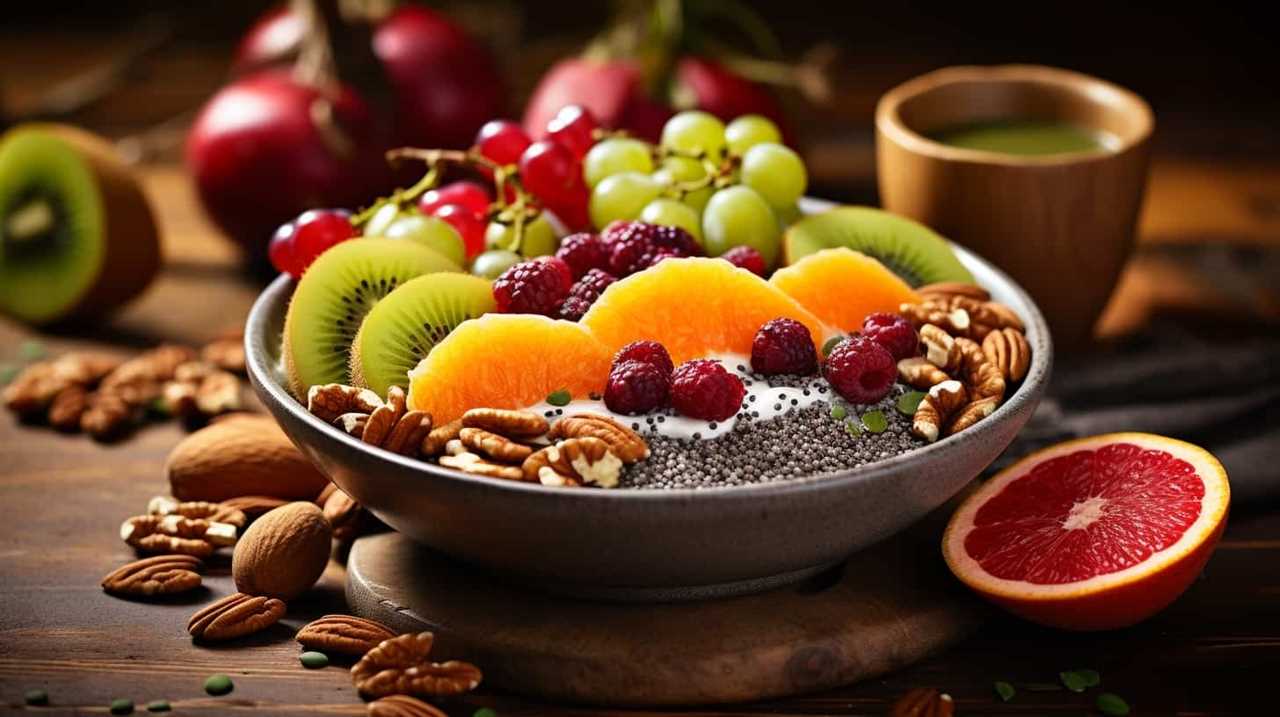
Incorporating chia seeds into our gluten-free recipes not only adds a delightful crunch but also boosts the nutritional value of our meals. These tiny seeds can be used in various ways, such as adding them to smoothies, puddings, or baked goods. Chia seed recipes are versatile and offer a wide range of options to suit different tastes and dietary preferences.
Nutritional Benefits of Chia Seeds
Now let’s delve into the impressive nutritional benefits that chia seeds offer in our gluten-free diets. Chia seeds are a powerhouse of nutrients, packed with fiber, protein, and healthy fats. They are also rich in essential vitamins and minerals like calcium, magnesium, and iron. These tiny seeds are known for their high antioxidant content, which helps protect our bodies from oxidative stress and inflammation.
Incorporating chia seeds into gluten-free baking is a great way to boost the nutritional value of your recipes. They can be used as an egg substitute, providing a binding agent that works well in baked goods. Chia seeds also add a delightful crunch and nutty flavor to your creations.
Here’s a handy table highlighting some of the key nutritional properties of chia seeds:
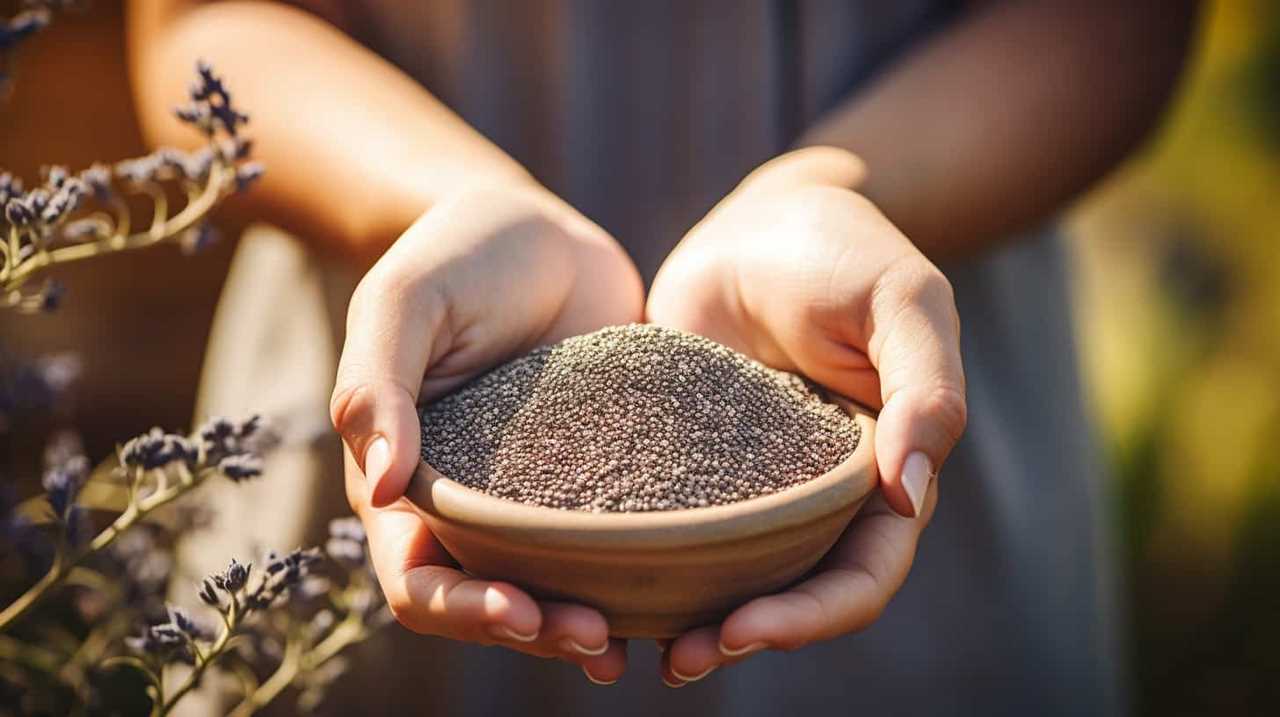
| Nutrient | Amount per 1 ounce (28 grams) |
|---|---|
| Fiber | 11 grams |
| Protein | 4 grams |
| Omega-3 Fatty Acids | 5 grams |
| Calcium | 18% of the Daily Value |
| Iron | 12% of the Daily Value |
Incorporating chia seeds into your gluten-free diet not only adds a nutritional boost but also enhances the taste and texture of your meals. So go ahead, sprinkle some chia seeds on your salads, yogurt, or smoothies, and reap the many benefits they have to offer.
Incorporating Chia Seeds in Everyday Meals
Let’s explore the various health benefits of chia seeds. Chia seeds are packed with nutrients like fiber, omega-3 fatty acids, and antioxidants, making them a great addition to our diet.
Discover creative recipes to incorporate them into our everyday meals. We can experiment with chia seed pudding, sprinkle them on top of salads or yogurt, or use them as an egg substitute in baking.
Learn how they can be used as substitutes in gluten-free diets. With their versatility and nutritional value, chia seeds can be easily incorporated into our daily meals to maximize the nutrition in our gluten-free diets.
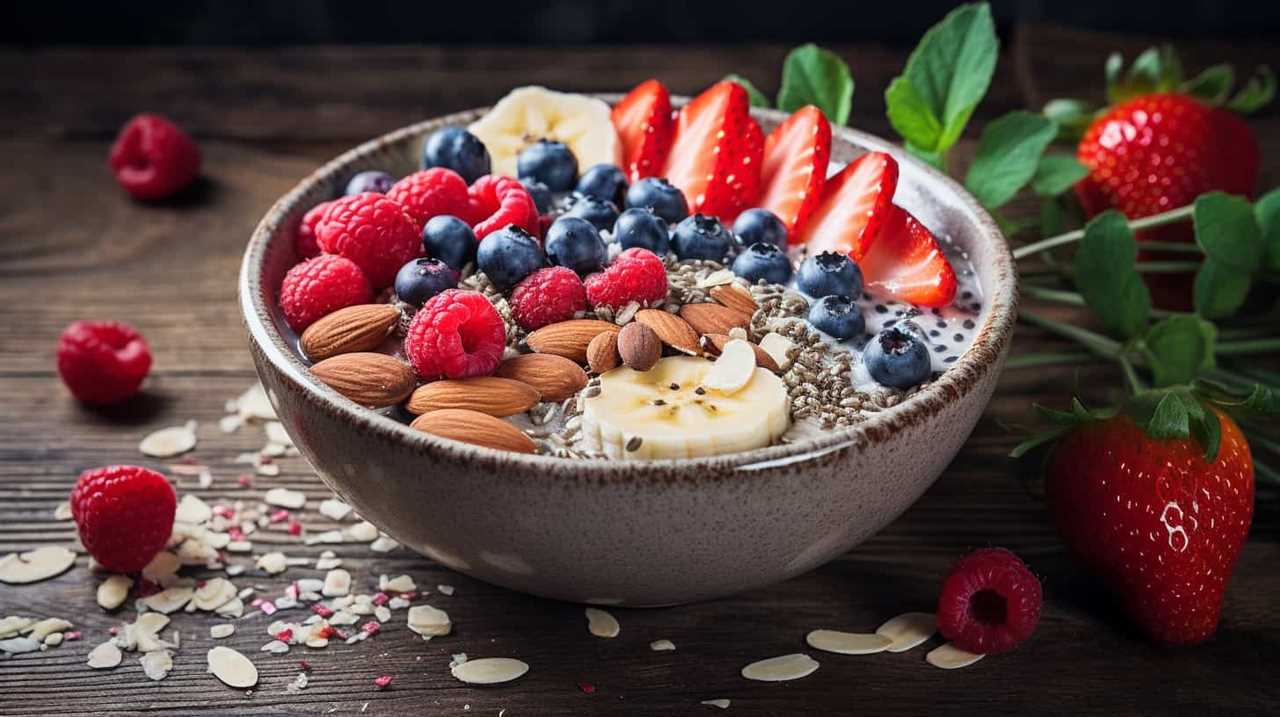
Chia Seed Health Benefits
We love incorporating chia seeds in our everyday meals to take advantage of their numerous health benefits. Chia seeds are packed with nutrients and can easily be added to a variety of dishes. Here are some ways to incorporate chia seeds into your meals:
- Chia seed recipes:
- Add chia seeds to your smoothies for an extra boost of fiber and omega-3 fatty acids.
- Sprinkle chia seeds on top of your yogurt or oatmeal for added texture and nutrition.
- Chia seed pudding:
- Make a delicious chia seed pudding by combining chia seeds with your choice of milk and sweetener. Let it sit overnight in the refrigerator, and enjoy a nutritious and satisfying dessert or snack.
Chia seeds are a great addition to any diet, as they provide essential nutrients and can easily be incorporated into your favorite meals. So go ahead and start reaping the health benefits of chia seeds today!
Creative Chia Seed Recipes
For maximum nutrition in gluten-free diets, we can explore a multitude of creative chia seed recipes that incorporate these nutrient-rich seeds into our everyday meals. Chia seeds are incredibly versatile and can be easily incorporated into various dishes, adding a nutritional boost to our diets.
One popular way to include chia seeds in our meals is by making chia seed smoothies. Simply blend together your favorite fruits, a liquid of your choice (such as almond milk or coconut water), and a tablespoon or two of chia seeds. This won’t only add a subtle nutty flavor but also provide a good dose of omega-3 fatty acids, fiber, and protein.

Another delicious option is chia seed pudding. Mix chia seeds with a liquid like coconut milk or yogurt, sweeten with honey or maple syrup, and let it sit in the refrigerator overnight. The result is a thick and creamy pudding that can be enjoyed as a healthy dessert or even as a breakfast option.
By incorporating chia seeds into our everyday meals through recipes like chia seed smoothies and chia seed pudding, we can maximize the nutrition in our gluten-free diets.
Now, let’s explore how chia seeds can be used as substitutes in various recipes.
Chia Seeds as Substitutes
To incorporate chia seeds into our everyday meals, we can explore using them as substitutes in various recipes, adding a nutritious twist to our gluten-free diets. Chia seeds are incredibly versatile and can be incorporated into a wide range of dishes. Here are two ideas to get you started:

- Chia Seed Pudding: Replace traditional pudding ingredients with chia seeds for a healthier alternative. Simply mix chia seeds with your choice of dairy or plant-based milk, sweetener, and flavorings such as vanilla or cocoa powder. Let it sit in the refrigerator overnight, and in the morning, you’ll have a delicious and nutritious pudding.
- Chia Seed Smoothies: Add a tablespoon or two of chia seeds to your favorite smoothie recipe. Not only will it add a boost of nutrition, but it will also help thicken the smoothie and keep you feeling full for longer.
Boosting Fiber Intake With Chia Seeds
To increase our fiber intake, we can incorporate chia seeds into our gluten-free diets. Chia seeds are a great source of fiber, with just one ounce providing a whopping 11 grams. Fiber is essential for promoting healthy digestion and regulating blood sugar levels. By adding chia seeds to our meals, we can boost our fiber intake and support overall gut health.
One way to incorporate chia seeds is by adding them to smoothies. Simply blend a tablespoon or two of chia seeds into your favorite smoothie recipe for an extra fiber boost. The chia seeds will also add a nice texture and help thicken the smoothie.
In the next section, we’ll explore how chia seeds can enhance our omega-3 fatty acid intake, further maximizing the nutritional benefits of our gluten-free diets.
Enhancing Omega-3 Fatty Acid Intake With Chia Seeds
Let’s explore how we can boost our omega-3 fatty acid intake by incorporating chia seeds into our gluten-free diets. Chia seeds are an excellent source of omega-3 fatty acids, which offer numerous health benefits.

Here are two ways we can incorporate chia seeds into our daily routine:
- Add chia seeds to smoothies: Chia seeds can be easily added to your favorite smoothie recipes. Simply sprinkle a tablespoon or two of chia seeds into your blender along with fruits, vegetables, and other ingredients. This won’t only enhance the nutritional value of your smoothie but also provide a good dose of omega-3 fatty acids.
- Make chia seed puddings: Chia seed puddings are a delicious and nutritious way to incorporate chia seeds into your diet. Mix chia seeds with your choice of milk, sweetener, and flavorings, and let it sit in the refrigerator overnight. The chia seeds will absorb the liquid and form a creamy texture, perfect for a healthy and satisfying dessert.
Incorporating chia seeds into our smoothies and recipes can help us maximize our omega-3 fatty acid intake and enjoy the many benefits they offer.
Chia Seeds as a Source of Antioxidants
Chia seeds aren’t only rich in omega-3 fatty acids but also serve as a great source of antioxidants.
Antioxidants play a crucial role in protecting our cells from damage caused by free radicals, which are known to contribute to chronic diseases and aging.

Incorporating chia seeds into a gluten-free diet can provide an additional boost of antioxidants, further enhancing the nutritional benefits of this versatile seed.
Chia Seeds and Antioxidants
As we explore the benefits of chia seeds in maximizing nutrition in gluten-free diets, it’s important to highlight their role as a rich source of antioxidants. Antioxidants are compounds that protect our cells from damage caused by harmful molecules called free radicals.
Chia seeds are packed with antioxidants, making them an excellent addition to any diet. Here are two reasons why chia seeds are a great source of antioxidants:
- Chia seeds contain high levels of polyphenols, which are plant compounds known for their antioxidant properties. These polyphenols help to reduce inflammation in the body and protect against chronic diseases.
- Chia seeds are also rich in vitamin E, another powerful antioxidant. Vitamin E helps to protect our cells from oxidative stress and supports a healthy immune system.
By incorporating chia seeds into your diet, you can boost your antioxidant intake and support overall health and well-being.

Now, let’s delve into the nutritional benefits of chia seeds.
Nutritional Benefits of Chia
Continuing our exploration of maximizing nutrition in gluten-free diets with seeds, it is important to highlight the nutritional benefits of chia seeds, particularly as a source of antioxidants. Chia seeds are tiny black seeds that pack a powerful punch when it comes to nutrition. One of their standout features is their high antioxidant content, which can help protect our cells from damage caused by free radicals. Antioxidants are compounds that neutralize these harmful molecules and reduce the risk of chronic diseases such as heart disease and cancer.
To further illustrate the nutritional benefits of chia seeds, here is a table that compares their antioxidant content to other common seeds:
| Seed Type | Antioxidant Content (per 1 oz) |
|---|---|
| Chia Seeds | 4,870 ORAC units |
| Flaxseeds | 1,800 ORAC units |
| Pumpkin Seeds | 1,400 ORAC units |
As you can see, chia seeds are a standout choice for those looking to increase their antioxidant intake. Incorporating chia seeds into your diet is not only a delicious and versatile option, but it can also contribute to heart health by reducing oxidative stress and inflammation. To reap the benefits, try adding chia seeds to smoothies, yogurt, oatmeal, or even baking them into healthy treats.

Managing Blood Sugar Levels With Chia Seeds
By incorporating chia seeds into our gluten-free diets, we can effectively manage blood sugar levels. Chia seeds are a great addition to a diabetes management plan because they have a low glycemic index and are rich in fiber and protein. Here are two ways chia seeds can help manage blood sugar levels:
- Regulating blood sugar: Chia seeds form a gel-like substance when mixed with liquid, which slows down the digestion and absorption of carbohydrates. This helps prevent spikes in blood sugar levels after meals.
- Increasing insulin sensitivity: Chia seeds are packed with omega-3 fatty acids, which have been shown to improve insulin sensitivity. By enhancing the body’s response to insulin, chia seeds can help regulate blood sugar levels more efficiently.
Incorporating chia seeds into our gluten-free diets can be a simple and effective way to manage blood sugar levels and support overall health.
Chia Seeds for Weight Management in Gluten-Free Diets
When it comes to weight management in gluten-free diets, chia seeds can be a valuable addition. Chia seeds are known for their ability to promote satiety, helping to curb cravings and overeating.
Additionally, these seeds are rich in fiber, which aids in digestion and can contribute to a healthy weight.

Chia Seeds for Satiety
Using chia seeds for weight management in gluten-free diets involves incorporating them into our meals and snacks. Chia seeds are an excellent addition to a gluten-free diet due to their satiety benefits and versatility in recipes. Here are some ways chia seeds can help with weight management:
- Chia seeds are rich in fiber, which can help promote feelings of fullness and reduce overeating.
- When mixed with liquid, chia seeds form a gel-like substance that expands in the stomach, further enhancing satiety.
- Chia seeds can be added to smoothies, yogurt, oatmeal, or baked goods for an extra boost of nutrition and to increase the feeling of fullness.
Incorporating chia seeds into our gluten-free meals and snacks not only provides us with essential nutrients but also helps us stay satisfied for longer, aiding in weight management.
Now, let’s explore how chia seeds can benefit digestion.
Chia Seeds for Digestion
To continue maximizing nutrition in gluten-free diets with seeds, let’s explore the benefits of incorporating chia seeds for digestion and weight management.

Chia seeds are a powerhouse of nutrients that can support a healthy digestive system and aid in weight management. These tiny seeds are packed with fiber, which promotes regular bowel movements and helps prevent constipation.
Additionally, the high fiber content of chia seeds helps you feel fuller for longer, which can be helpful for weight management. Chia seeds also provide a good source of energy, thanks to their high omega-3 fatty acid content.
Moreover, chia seeds are excellent for hydration as they can absorb up to 10 times their weight in water, helping to maintain proper hydration levels in the body.
Chia Seeds as a Plant-Based Protein Source
Chia seeds provide a valuable plant-based protein source for individuals following a gluten-free diet. They’re an excellent alternative protein option for those who can’t consume gluten or choose to follow a plant-based diet.

Here are some reasons why chia seeds are a great choice for plant-based protein:
- High protein content: Chia seeds are packed with protein, containing about 14% protein by weight. This makes them an excellent plant-based protein source to incorporate into your diet.
- Complete protein: Chia seeds contain all essential amino acids, making them a complete protein source. This is important as it ensures that your body gets all the necessary building blocks for overall health and well-being.
- Easy to digest: Unlike some other plant-based protein sources, chia seeds are easily digestible. This means that your body can efficiently absorb and utilize the protein they provide.
- Versatile and easy to incorporate: Chia seeds can be added to a variety of dishes, such as smoothies, yogurt, oatmeal, and baked goods. They can also be used as an egg substitute in recipes, making them a versatile ingredient in gluten-free cooking.
Maximizing Calcium Intake With Chia Seeds
How can we ensure that our gluten-free diet includes an adequate intake of calcium? Maximizing calcium absorption is crucial for maintaining strong bones and overall bone health. Chia seeds can be a great addition to our diet in order to achieve this goal.
Chia seeds are rich in calcium, with just one ounce providing about 18% of the recommended daily intake. Additionally, chia seeds contain other nutrients like magnesium and phosphorus, which are important for bone health as well. To maximize the absorption of calcium from chia seeds, it’s recommended to consume them ground or soaked. This helps to break down the seeds and release their nutrients for better absorption in our bodies.
Incorporating chia seeds into our gluten-free diet is a simple and effective way to ensure we’re getting enough calcium for strong and healthy bones.
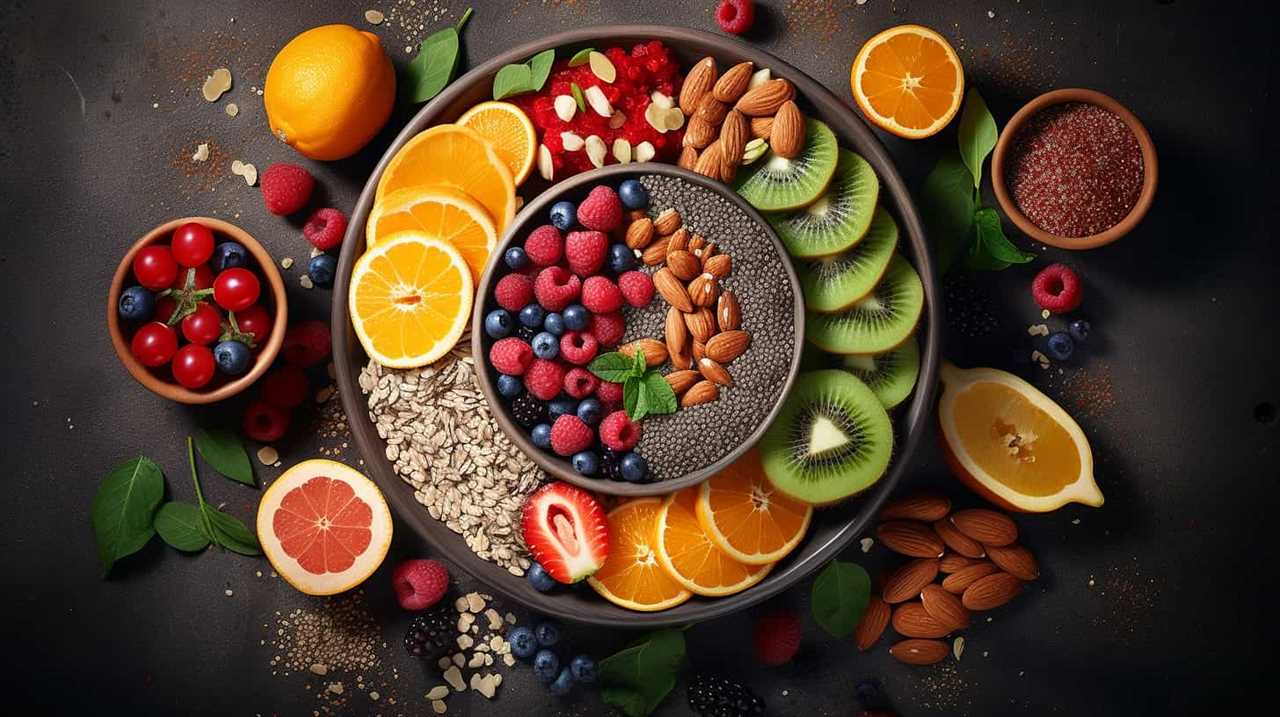
As we’ve seen, chia seeds aren’t only beneficial for maximizing calcium intake, but they also offer several advantages for digestive health. Let’s explore how chia seeds can improve our digestive system and support overall gut health.
Chia Seeds for Improved Digestive Health
Incorporating chia seeds into our gluten-free diet can also contribute to improved digestive health and support overall gut health.
Here’s how chia seeds can help in promoting regularity and improving gut health:
- Chia seeds are rich in dietary fiber, which adds bulk to the stool and helps prevent constipation. This can aid in promoting regular bowel movements.
- The soluble fiber in chia seeds acts as a prebiotic, providing nourishment for the beneficial bacteria in our gut. This can help maintain a healthy balance of gut flora and support overall gut health.
By including chia seeds in our gluten-free diet, we can improve our digestive health and promote regularity.
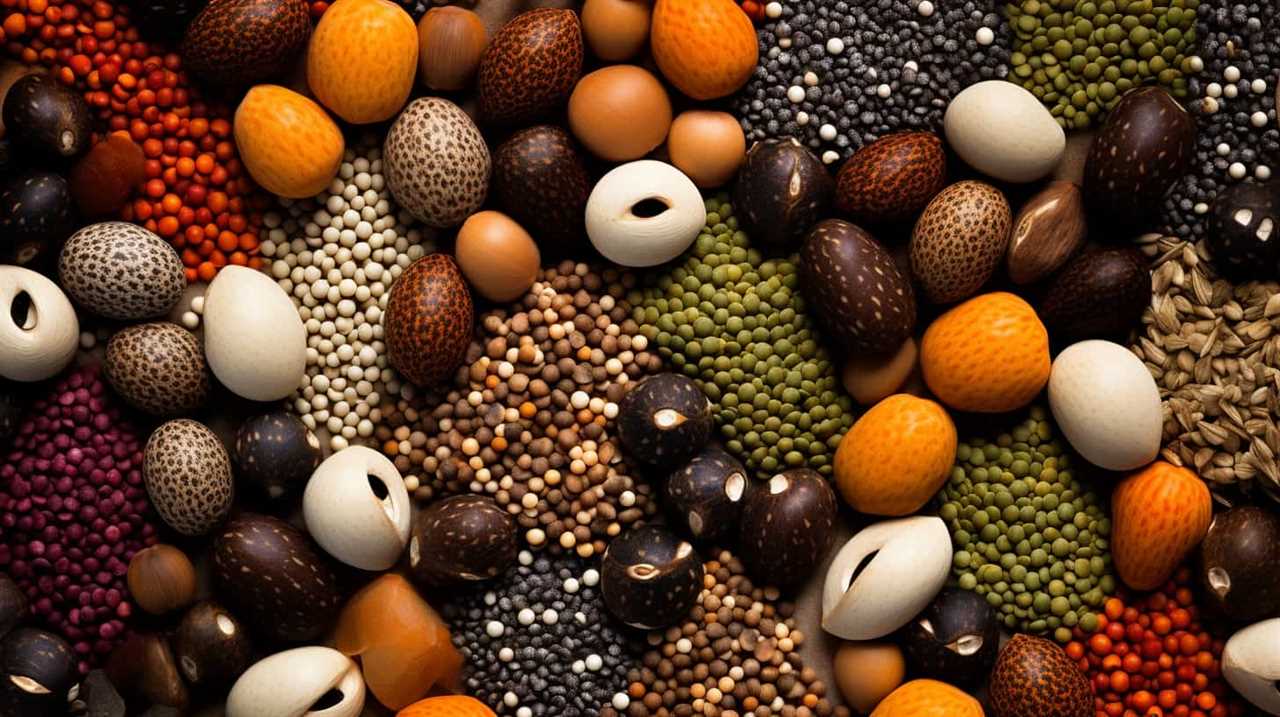
Remember to drink plenty of water when consuming chia seeds to ensure optimal digestion.
Chia Seeds in Gluten-Free Baking and Cooking
To maximize the nutrition in our gluten-free diets, we can utilize chia seeds in various baking and cooking recipes. Chia seeds are a versatile ingredient that can be easily incorporated into many dishes, adding a nutritional boost.
One way to incorporate chia seeds is by adding them to smoothies. They can be mixed with fruits, vegetables, and other ingredients to create a delicious and nutritious beverage.
Chia seeds can also be used in salad dressings. By blending them with oil, vinegar, herbs, and spices, you can create a flavorful dressing that isn’t only gluten-free but also packed with omega-3 fatty acids and fiber.
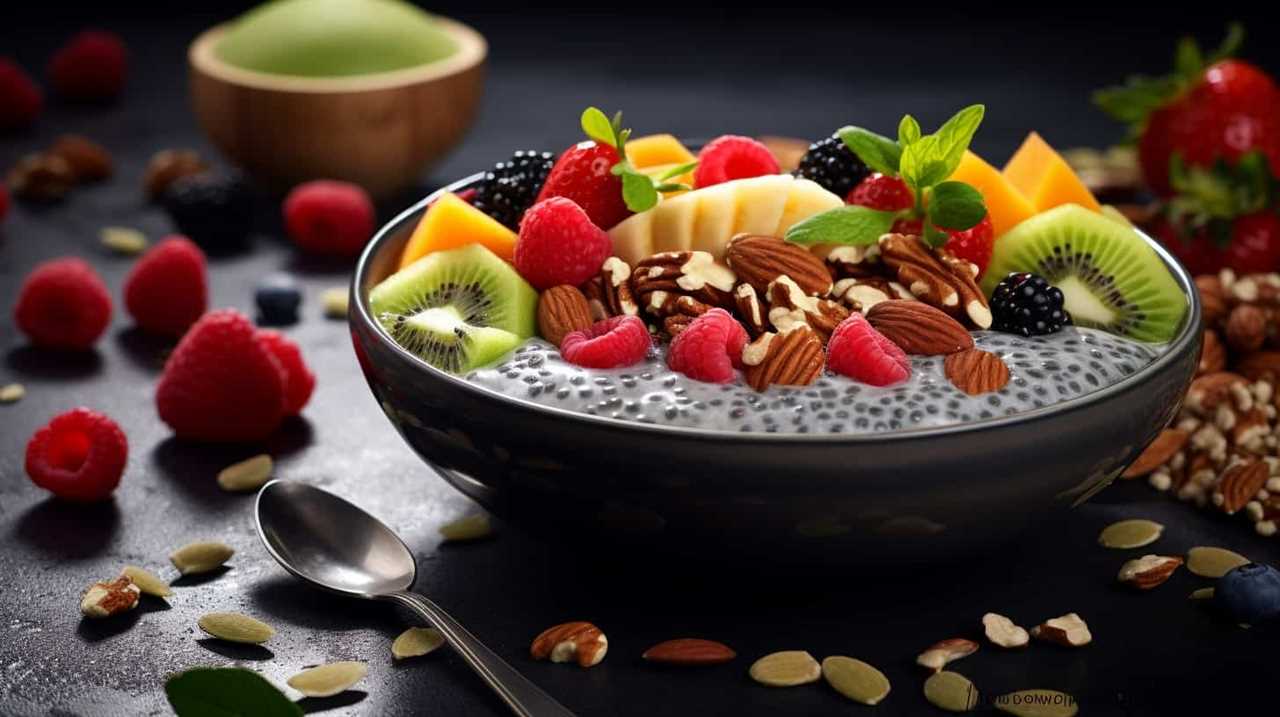
Frequently Asked Questions
Can Chia Seeds Be Used as a Substitute for Eggs in Gluten-Free Baking?
Yes, chia seeds can be used as a substitute for eggs in gluten-free baking. They act as a binding agent in recipes and are also a great source of omega-3 fatty acids in gluten-free diets.
Are There Any Potential Side Effects or Risks Associated With Consuming Chia Seeds?
When it comes to the potential side effects and risks of consuming chia seeds, it’s important to stay informed. While generally safe, some individuals may experience digestive discomfort or allergic reactions.
How Should Chia Seeds Be Stored to Maintain Their Freshness and Nutritional Value?
To maintain the freshness and nutritional value of chia seeds, store them in an airtight container in a cool, dry place. Incorporate chia seeds into your diet by using them in various recipes for added nutrition.
Can Chia Seeds Help With Reducing Inflammation in the Body?
Yes, chia seeds can help reduce inflammation in the body. They are packed with omega-3 fatty acids, which have been shown to have anti-inflammatory properties. Incorporating chia seeds into a gluten-free diet can also support weight loss and heart health.
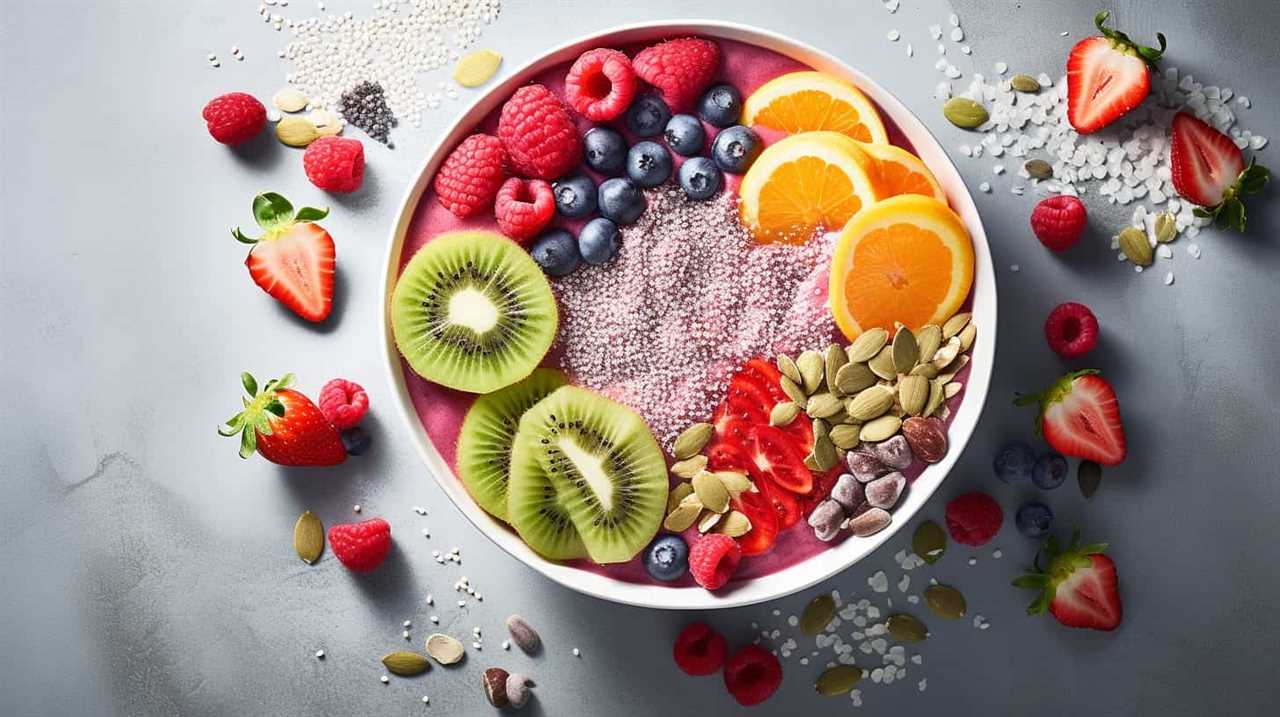
What Is the Recommended Daily Intake of Chia Seeds for Optimal Health Benefits?
For optimal health benefits, the recommended daily intake of chia seeds varies depending on factors such as age, sex, and overall health. Incorporating chia seeds into smoothies and using chia seed recipes can be a great way to maximize their nutritional value.
Conclusion
Incorporating chia seeds into gluten-free diets is a simple and effective way to maximize nutrition. These tiny seeds are packed with essential nutrients such as fiber, omega-3 fatty acids, and plant-based protein.
They can be easily added to everyday meals, boosting both the taste and nutritional value. Whether you sprinkle them on your morning yogurt or use them in gluten-free baking, chia seeds offer a versatile and nutritious addition to any diet.
Don’t underestimate the power of these small seeds to enhance your overall health and well-being.
